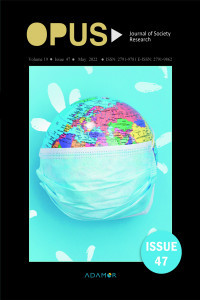The New Deal for New Americans: Immigration Status and Mental Health
Extreme circumstances immigrants experience causes them to have a higher risk for mental health problems. It gets even more severe for refugees than host populations and other migrant groups. Thus, in this paper, mental health disparities between native-born citizens and refugees in the US will be investigated by considering social policies. Firstly, immigration status in the US will be investigated in terms of its relation to mental health. Then, mental health will be examined, and the focus will be on anxiety disorders and depression as these are the two common disorders among refugees. In the following section, Social-Ecological Model will be used as a framework to explain the relationship between immigration status and mental health. The Refugee Act of 1980 and The New Deal for New Americans Act will be used to understand the current political climate in terms of the refugee situation in the US, and we will examine how this has an impact on refugees' mental health. This paper will be concluded after mentioning the obstacles and the recommendations.
Keywords:
Social Policy, Mental Health, Social-Ecological Model, Refugees Immigrants,
___
- Acevedo-Garcia, D., Bates, L. M., Osypuk, T. L., & McArdle, N. (2010). The effect of immigrant generation and duration on self-rated health among US adults 2003–2007. Social science & medicine, 71(6), 1161-1172.
- American Psychiatric Association. (2013). Diagnostic and statistical manual of mental disorders (DSM-5®). American Psychiatric Pub.
- Bhugra, D., Gupta, S., Bhui, K., Craig, T. O. M., Dogra, N., Ingleby, J. D., ... & Stompe, T. (2011). WPA guidance on mental health and mental health care in migrants. World Psychiatry, 10, 2-10. https://doi.org/10.1002/j.2051-5545.2011.tb00002.x.
- Blue, L., & Fenelon, A. (2011). Explaining low mortality among US immigrants relative to native-born Americans: the role of smoking. International journal of epidemiology, 40(3), 786-793.
- Centers for Disease Control and Prevention (CDC), the social-ecological model: A framework for prevention.http://www.cdc.gov/violenceprevention/overview/social-ecologicalmodel.html (retrieved November 9, 2019).
- Cruwys, T., Haslam, S. A., Dingle, G. A., Haslam, C., & Jetten, J. (2014). Depression and social identity: An integrative review. Personality and Social Psychology Review, 18(3), 215-238.
- Denton, M., Prus, S., & Walters, V. (2004). Gender differences in health: A Canadian study of the psychosocial, structural and behavioral determinants of health. Social science & medicine, 58(12), 2585-2600.
- Filion, N., Fenelon, A., & Boudreaux, M. (2018). Immigration, citizenship, and the mental health of adolescents. PloS one, 13(5), e0196859.
- Jentsch, B., Durham, R., Hundley, V., & Hussein, J. (2007). Creating consumer satisfaction in maternity care: The neglected needs of migrants, asylum seekers, and refugees. International Journal of Consumer Studies, 31(2), 128-134.
- Lifson, A. R., Thai, D., & Hang, K. (2001). Lack of immunization documentation in Minnesota refugees: challenges for refugee preventive health care. Journal of immigrant health, 3(1), 47-52.
- Yayın Aralığı: Yılda 6 Sayı
- Başlangıç: 2011
- Yayıncı: ADAMOR Toplum Araştırmaları Merkezi
Sayıdaki Diğer Makaleler
Esra ÖZMEN, Ersin KARAMAN, Nurcan ALKIŞ BAYHAN
Songül ZEHİR, Melike ZEHİR, Doğan BAŞAR
Mustafa ŞEKER, Gülsüm ŞEN, Ahmed Emin OSMANOĞLU
Users' Emotional Experiences in Online Shopping: Effects of Design Components
Ersin KARAMAN, Nurcan ALKIŞ BAYHAN, Esra ÖZMEN
Assessment of Antoni Gaudi's Design Approach on the Concept of Biophilia: Case of Casa Battlo
